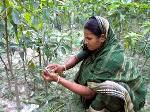Bangladesh
Published on Sat, 2020-10-10 00:00
Join the Conference and empower BDCSOprocess virtual annual conference 2020 In Zoom with Bangla and English translation facilities. Non-member, please register in this link, you will receive the software link later. Session 10th Oct. Dhaka time 11h30: UN in 75, Interfacing Government and Civil Societies for Development and Sustainable Peace |
Published on Wed, 2019-10-23 14:40
Inequality is a major concern for civil society in Bangladesh. The report by the Equity and Justice Working Group Bangladesh (EquityBD) quantifies rising inequalities. The Palma ratio (between the income of the richest 10% and that of the poorest 40%) grew from 1.68 in 1964 to 2.93 in 2016. Inequalities are addressed in the official plans but EquityBD considers that implementing them “will be a tough job for the Bangladesh government due to lack of good governance in some cases. The financial sector is still in a need of special attention since illicit financiale flows and huge amounts of non- performing bank loans are still in force. Decentralization of development is another crucial issue.” |
Published on Sun, 2018-08-26 00:00
The UN Committee for Development Policy has announced Bangladesh’s eligibility for graduation from Least Developed Country to Developing Country. This success also brings confidence for achieving the SDGs. In the last 15 years, with limited resources, Bangladesh has witnessed one of the fastest reductions in poverty anywhere in the world. The country has met the target in reducing the proportion of population below the national poverty line (currently 22.4%) three years ahead of time. It has reached the targets in reducing infant mortality rate from 92 per 1000 live births in 1990 to 46 now; and in decreasing the prevalence of underweight children less than five years of age from 66 percent in 1990 to 32.6 percent at present. In terms of education, the country has achieved nearly 100 percent enrollment in primary schools; and attained gender parity with more girls than boys in primary and secondary schools. |
Published on Mon, 2017-10-09 12:45
The government of Bangladesh has announced an inclusive approach to development so that the poorest and the most vulnerable populations can be integrated into its national development efforts. This "whole society approach" requires the engagement of all stakeholders in the process. Civil society organizations envisage a strengthening of democratic institutions and participatory governance to achieve the SDGs in Bangladesh, with participation of civil society in all levels of implementation, from the national to the grassroots level. They therefore demand that "IFIs and the WTO must respect policy spaces for LDCs and developing countries so that national sovereignty in decision-making and the very nature of the State in respect to welfare and redistributive justice can be protected". |
|
The 2017 High Level Political Forum on Sustainable Development (10-19 July), scheduled to review progress on implementing the 2030 Agenda on Sustainable Development and selected Sustainable Development Goals (SDGs), features Voluntary National Reviews from 44 countries, including Bangladesh. The reviews aim to facilitate the sharing of experiences, including successes, challenges and lessons learned, with a view to accelerating the implementation of the 2030 Agenda.
The selected seven goals to be reviewed in depth include SDG 17 on a revitalized global partnership for sustainable development. The other six are SDG 1: End poverty in all its forms everywhere; SDG 2: End hunger, achieve food security and adequate nutrition for all, and promote sustainable agriculture; SDG 3: Ensure healthy lives and promote well-being for all at all ages; SDG 5: Achieve gender equality and empower all women and girls; SDG 9: Build resilient infrastructure, promote inclusive and sustainable industrialization and foster innovation; SDG 14: Conserve and sustainable use the oceans, seas and marine resources. SDG 17: Strengthen and enhance the means of implementation and global partnership for sustainable development will be considered in each yearly review.
|
|
Source: . Published on Sat, 2016-07-09 00:20
BHOLA, Bangladesh, Jul 9 2016 (IPS) - Four years ago, Farzana Aktar Ruma, now 18, was almost married off without her consent. Her parents had settled on someone they considered a reasonably wealthy young man with a good family background, and did not want to miss the opportunity to wed their eldest daughter. |
Published on Fri, 2016-06-10 15:11
Since the 1990s, when democracy was reinstated, Bangladesh has been able to make some extraordinary achievements. The poverty rate was 57 percent in 1991 and was reduced to 31.5 percent in 2010, enrolment in primary education reached 98 per cent and girls slightly outnumber boys in schools. But budget allocations to health and social security are far from enough, corruption and illicit financial flows divert resources and climate change is set to produce more physical damage in Bangladesh by 2025 than in any other country. Rising sea levels, severe storms and other extreme climate-related events are going to produce millions of "climate refugees" in a country that has not contributed to generate this phenomenon and is not receiving compensation for enormous loss and damages. |
SUSCRIBE TO OUR NEWSLETTER







